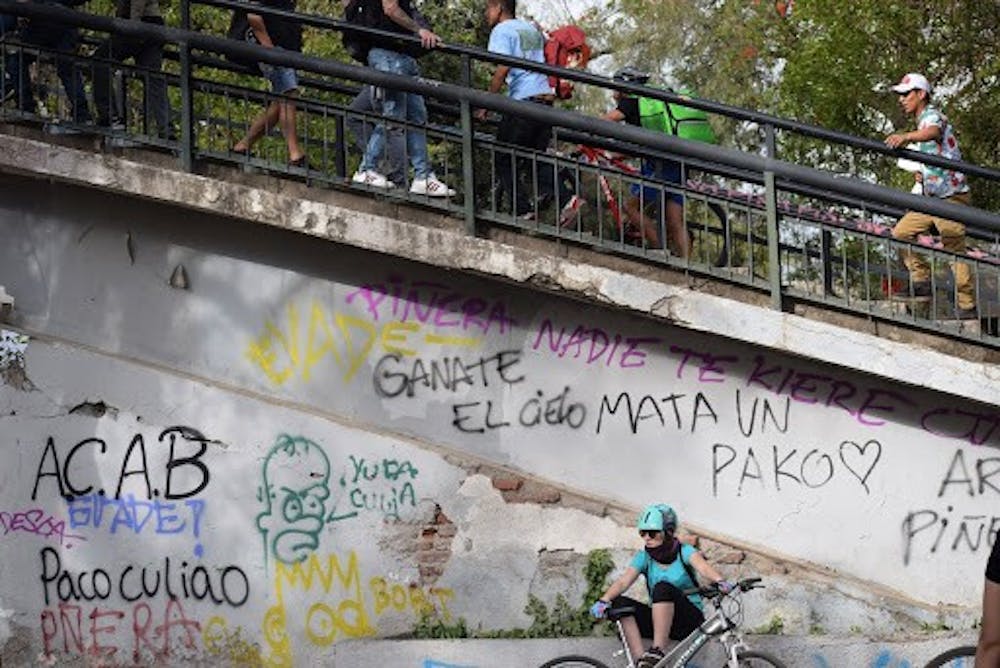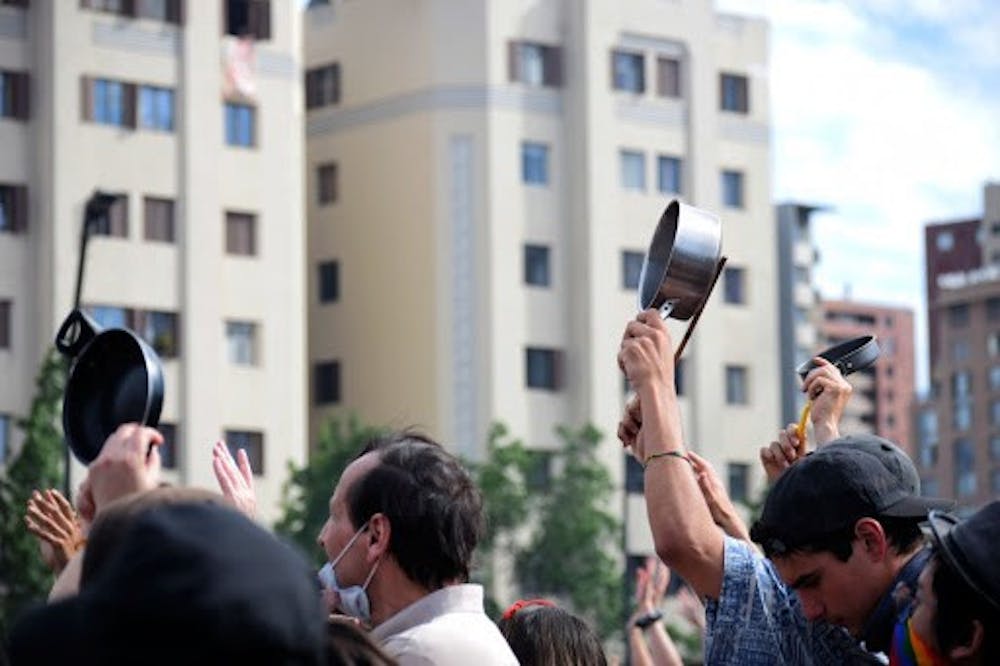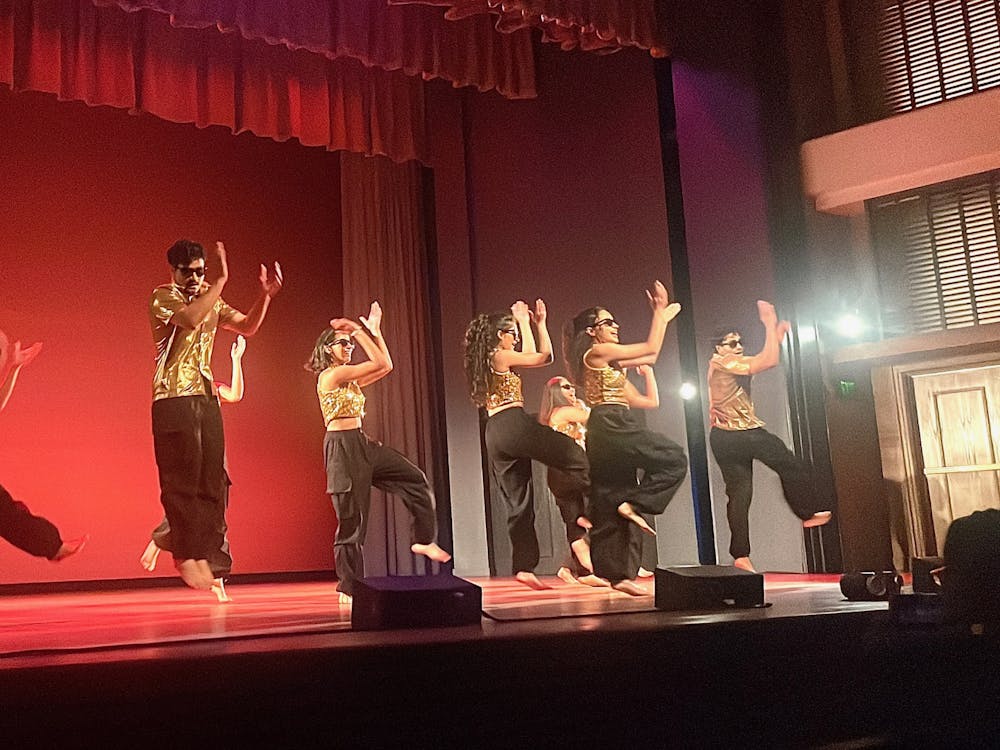On the last normal day that I can remember, I went to class and then skipped yoga to go see "Joker" with some friends.
While we drove to the theater, I remember looking at the lights of Santiago, Chile, and feeling a strong sense of home. To be struck by this sentiment in a city where I used to feel so out of place was a huge accomplishment.
Santiago had become more than just a place I was studying in. It had become my place.
If you’ve seen "Joker," I can describe what happened next by saying that my place transformed into Gotham City in a matter of hours. One moment, I was talking to my friends about where we were going to go for karaoke that night. The next, I glanced at the news and buildings were on fire.
That was October. I did not have class for the remainder of the semester.
The city I have grown to call home looks as if a war has happened there. With metro stations still wrecked and grocery stores left in ashes, the graffiti all over the streets silently speaks of the frustrations that led to the events of Oct. 18.

A woman rests with her bike just outside of a protest. The wall behind her is covered with graffiti characteristic of that seen all over the city, criticizing the police force and the president.
On that day, protests against a recent raise in the metro fare escalated to a level that Chile had not seen in decades. Since then, a country-wide movement has exploded, demanding systematic changes in economic and social policies that have been in place since the Chilean military dictatorship that ended in 1990.
Like most University of Richmond students who study abroad, I had expected the semester to provide experiences that would change me. That’s why I did it -- to see new things, meet different people and broaden my worldview.
But I never expected to live through what some are calling a revolution. And, figuring out my role in this revolution — a fight that was in my place but not quite my fight — had been one of the biggest challenges of my semester yet.
During the early days of the movement, I saw other international students going to the plazas, wanting to feel a part of history. But despite the energy that exists in a people rising up, I found myself hesitant to join in.
A small part of this hesitation came from knowing that I could get arrested or injured at the protests, but more of it came from the fact that I didn’t yet feel comfortable taking a stand.
Enjoy what you're reading?
Signup for our newsletter
I couldn’t comprehend the chants echoing through the crowds, not because I didn’t follow the Spanish, but because I didn’t know the context. I felt that clapping along to the rhythm of the pots and pans would be supporting something that I was completely ignorant about. Because the truth is that I am inherently removed from this movement.
Having only lived here for four months when the protests began, I had never had to think about minimum wages, the pension system, education, healthcare, water or indigenous rights because they didn’t affect me.
But for the people protesting, those things cannot be ignored. The outcome of this fight will affect the quality of their lives, whereas I have the privilege of knowing that it will not affect mine.
I didn't have to go to the streets where people are being teargassed, shot and arrested by the police in order to fight for a decent quality of life.
In addition to my logistical separation from the political systems there, there was a deeper cultural rupture: my personal history exists in a different part of the world. So when the president announced a state of emergency and the military was called to the streets, I knew that it had significance—it was hard to ignore the armed soldiers on every street corner.
But those seven early nights of state-enforced curfew for me were full of games and dance parties with my housemates.
I didn’t know how eerily similar it felt to the dictatorship, where people were killed for breaking curfew. It didn’t make me relive being imprisoned and tortured. It didn’t remind me of loved ones who were killed or disappeared during the dictatorship.
It didn’t remind me of these things because I did not live through them.
But my host parents did. And my professors. And my friends’ parents, too.
And they can’t forget.
So every time I heard that another person had been shot by the police or abused in the Metro station that I used to use every day, it was hard for me to believe.
Lacking a personal history in Chile gives me the privilege of denial, another way that I remain separated from the people in Santiago and will never fully be able to share their battle.

An armed soldier stands guard in front of a metro station, graffitied with the Spanish word “evade,” which represents the first form of protest when people would jump over metro turnstiles to evade paying the fare. Soldiers were stationed throughout the streets of Santiago during the week that the city and many other regions of Chile were under a state of emergency.
I feared that joining in the protests with my uneducated perspective would just trivialize the depth and seriousness of their fight.
I could see how important this was to people, and I didn’t want it to be something I took lightly.
But it turned out, not taking it lightly was more difficult than it seems.
Not taking it lightly meant diving in and trying to understand all of the sides of the story. It meant going for a run around the city every morning to see the fresh destruction and watching the way people interacted with it.
It meant declining offers from my international friends, dressed in their most activist-y outfits, who were going to the protests as a fun afternoon activity.
It meant, instead, going to the protests with the goal of hearing the perspectives of as many people as possible. It meant not joining in with the cheers, as contagious as the energy was.
It meant asking the hard questions and not believing everything I heard, trying to keep myself afloat in the information that was coming at me from all directions.
It meant trying to understand the depth of a fight that had been deepening in the hearts of these people for decades.
It meant that learning became my role in this battle, because it was the only thing I could authentically do.
In those weeks of investigating, I started to notice how challenging it is to make space for yourself to learn about an issue when you are surrounded by people who are already partial to it.
I didn’t only want to know what my Chilean university friends thought about the protests. I wanted to know how rich people felt, how poor people felt and how the police officers felt too.
This movement is not black and white. And without personal necessity and history here, I don’t think it would ever be fair for me to decide that there is only one way to see this.
Even though I did not have class for the majority of the semester, making an effort to learn the countless nuances of the movement turned out to be the most effective educational experience I have ever had.
It’s not often that you find yourself in the middle of history being made, with a total blank slate to fill in with information and countless places to search for it. During my semester abroad, I was forced to reevaluate the way I view democracy, human rights, neoliberalism, violence and inequality; many of my previous beliefs were completely transformed.
There is a very heavy pressure in today’s society to always know what we believe, but something I have realized is the importance of taking time to learn the complexities of issues before choosing where to stand.
In current political and social climates, there are infinite causes to fight for. We are inundated with information on our social media platforms every day telling us things that are wrong with the world in hopes that we will take them up as our own battle and spread the word.
So we often do.
We retweet the ideas, we change our Facebook profile picture in solidarity and we put slogans in our Instagram bios.
Of course, these actions can be part of making change, but how often do we take the time to truly learn about what we’re standing up for?

A person on a lamp post waving the Chilean state flag (top) and the Mapuche flag (bottom), a flag used as a symbol of the Mapuche Nation and indigenous communities in Chile and Argentina.
I agree that many of these causes are worth our support. But I believe that more than that, they’re worth our time and attention.
They are worth our curiosity and our questions, and they are worth us making an effort to understand them before getting behind them.
Being “woke” is so socially important these days that too many of us fall into the trap of picking a side before even knowing what we are claiming to stand for.
We think that the only strong thing we can do is have a steadfast opinion. We think that it’s best to be activists.
But does activism mean anything if we haven't had the courage to challenge these issues first?
I have learned that the stronger, braver and more honest thing to do is give yourself space and time to learn. We need to stop looking down on patience and we start allowing ourselves to exist in the gray for a little longer.
During my time in Chile, I had more authentic and productive political conversations than I had ever had before, because I was finally okay with admitting that I don’t know what I think. And because I was out of place in Santiago, that was an acceptable position to be in.
Once we recognize that learning is a valid role in social progress, once we can respect the “I don’t know, but I’m figuring it out” attitude for all people, we will be one step closer to more genuine and productive advancement in society.
In a world where activists take the time needed to make sure they believe in what they are fighting for, that is when we will begin to really make change.
Contact contributor Nina Joss at nina.joss@richmond.edu.
Support independent student media
You can make a tax-deductible donation by clicking the button below, which takes you to our secure PayPal account. The page is set up to receive contributions in whatever amount you designate. We look forward to using the money we raise to further our mission of providing honest and accurate information to students, faculty, staff, alumni and others in the general public.
Donate Now



